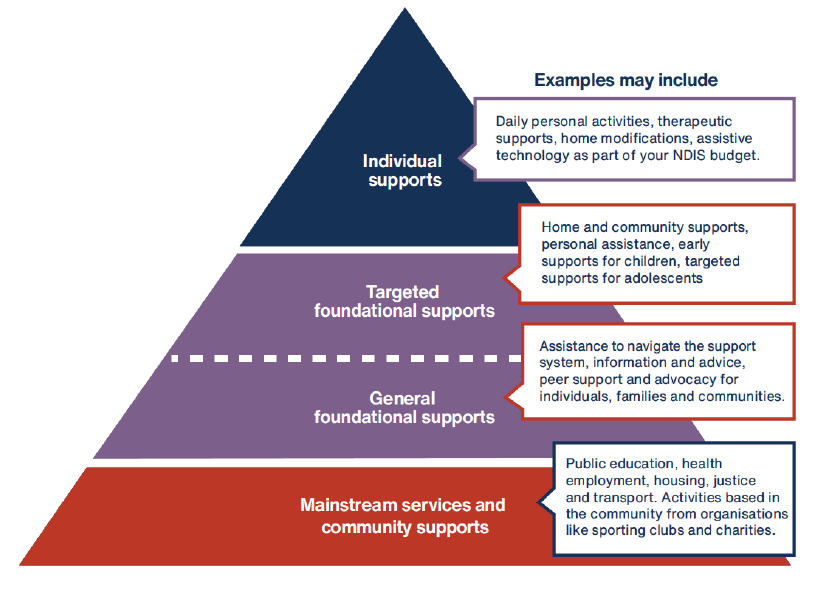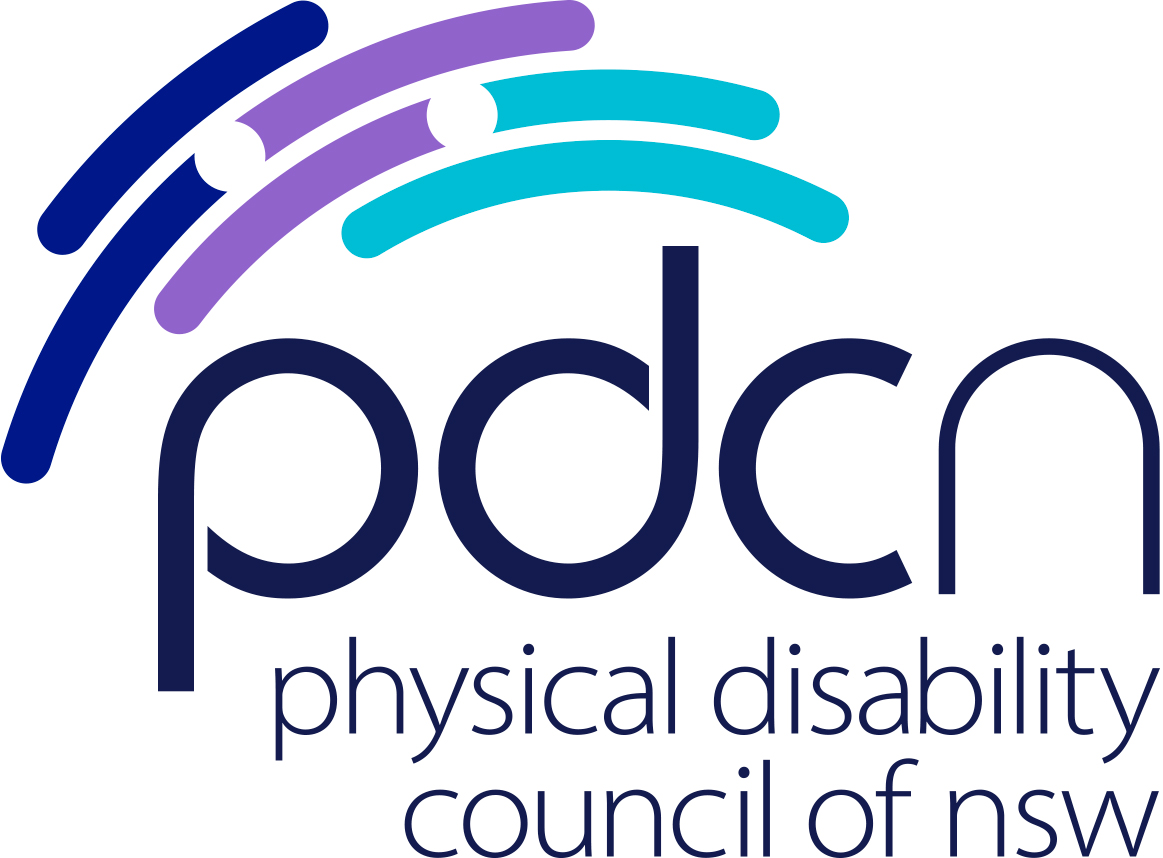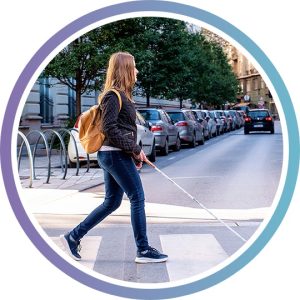
Contents
1. The voice of people with physical disability in NSW
2. Defining foundational supports
3. What people with physical disabilities want from foundational supports
4. Initial recommendations
1. The voice of people with physical disability in NSW
The Physical Disability Council of NSW (PDCN) is the peak body representing people with physical disabilities across New South Wales. This includes people with a range of physical disabilities, from young children and their representatives to aged people, who are from a wide range of socio-economic circumstances and live in metropolitan, rural and regional areas of NSW. Our core function is to influence and advocate for the achievement of systemic change to ensure the rights of all people with a physical disability are improved and upheld.
2. Defining foundational supports
For the purposes of this interim report, we have considered the definition of foundational supports made in the NDIS Review. However, for our full report we will consider a wider range of definitions developed by the disability community.
Background: The NDIS Review, published in December 2023, recommended the introduction of foundational supports for people with disability. This would form one part of a cohesive support system for all people with disabilities across Australia, comprising accessible mainstream services, foundational supports, navigator assistance, and individual NDIS support.
Foundational supports, a concept newly introduced by the NDIS Review, have been defined as supports that would be needed for a good life. These supports will be both general (for all people with disabilities) and targeted (for those with lower-level support needs who are not NDIS-eligible).
Foundational supports aim to provide essential services to all people with disabilities, bridging the gap between those eligible for the NDIS and those who are not, thereby preventing people from falling through the cracks. The goal of foundational supports is to improve inclusion, boost social and economic participation, and ensure that all people with disabilities receive support to attain aspirations.
There are two types of foundational supports proposed by the NDIS Review:
General foundational supports which includes information and advice, peer support, self-advocacy, and disability employment supports. General foundational supports also include ‘capacity building’, which is defined by the NDIS as development and training that helps people with disability develop skills and abilities that can enhance their independence, improve their quality of life and reach their goals. These supports would cater to all people with disabilities under 65 years of age.
Targeted foundational supports which are for those under 65 of age who are not eligible for the NDIS and include home and community supports, aids and equipment, capacity building for adults with psychosocial disabilities, early supports for families and children, and transition supports for young people. These supports are meant for early intervention or less intensive needs.
These foundational supports will sit alongside mainstream services and NDIS individual supports.
Mainstream services are for everyone and include accessible services like transport, healthcare, education, and community programs.
Individual supports are personalised budgets and supports available under the NDIS for specific needs.
 The NDIS Review characterised this support pyramid using the diagram above.
The NDIS Review characterised this support pyramid using the diagram above.
3. What people with physical disabilities want from foundational supports
In June 2024, PDCN launched a survey to understand the desired supports for people with physical disabilities outside the NDIS. This interim report summarises early findings, with a comprehensive report to follow later in 2024. The survey respondents include people with disabilities living in NSW in addition to parents and carers of children with disabilities. Of the 124 survey respondents who had completed the survey by 18th June 2024, 69% were between the ages of 46 and 64 and 73% of respondents identified as women. Approximately 47.6% of respondents were from Sydney metro area and 37.4% of respondents resided in regional NSW. 74.7% of respondents identified as having a physical disability and 53.1% were current NDIS participants.
People with disabilities and their families face a complex and fragmented service landscape with inconsistent costs, eligibility, and availability. Most of our survey respondents (56.6%) feel there are no adequate supports outside the NDIS, with affordability and reliance on informal support being significant challenges for people who cannot access NDIS supports. A 2022 study into ‘Access to Supports…for people with disability outside the NDIS’ by the University of Melbourne reported that 90% of people with disabilities did not have adequate support due to availability, accessibility, unreliable information, and lack of knowledge on where to find support. Concerns about the lack of parity between resourcing for supports for NDIS participants and those outside the scheme currently cause anxiety and concern for our survey respondents and PDCN’s Lived Experience Advisory Panel (LEAP).
Respondents to the PDCN survey and PDCN’s Lived Experience Advisory Panel stressed the importance of community inclusion and co-design in developing foundational supports, and the need for compliance and government cooperation in building a robust disability support landscape. Most respondents to our survey (86.2%) believe the NSW Government should fund additional disability services outside the NDIS, indicating a strong community desire for state-funded supports. 96.6% of respondents believe they would benefit from additional disability services, with key benefits including increased choice and control, assistance with daily activities, filling NDIS gaps, improving quality of life, enhancing community inclusion, providing income support, and increasing safety.
The most desired services include daily life assistance, health services, accessible transport, assistive technology, support workers, mental health support, community engagement, education, housing, and home modifications. Respondents emphasised the need for future supports to focus on choice and control (26.9%), regulation and auditing (9.7%), and accessibility and flexibility (8.6%). They also highlighted concerns about unqualified support workers, pricing structures, and the complexities within the support system.
We also heard that from survey respondents that foundational supports should triage people to the supports which are most appropriate to meet their needs. This system should provide a ‘soft landing’ and minimise administrative hurdles. The success of this model relies on knowledgeable local ‘Linkers’ or ‘Navigators’ at a one-stop gateway, assisting people with disabilities and their families to understand and navigate their options. This setup requires expertise to advise whether needs should be addressed by the NDIS, general foundational supports, targeted foundational supports or mainstream services. Foundational supports should serve as the initial point of contact, offering assessments and development and training for people with disability. They must be adaptable to meet the diverse needs of different communities, especially in regional areas where mainstream services may be less accessible.
4. Initial recommendations
Overall, the implementation of these interim recommendations would contribute to a more inclusive society where people with disabilities can lead fulfilling lives with greater independence through an improved support system. Appropriately designed foundational supports would help people with disabilities participate meaningfully in their communities. By addressing systemic barriers and improving service delivery, these recommendations aim to enhance both individual outcomes and social cohesion by creating a more inclusive, accessible, and supportive environment for people with physical disabilities and their families, enhancing their quality of life and overall well-being.
1. Prioritise community inclusion and co-design principles in the development of foundational supports. Involve people with disabilities, their families, and relevant stakeholders in designing and implementing support programs to better meet their needs and preferences. This requires significant investment from the NSW Government. This will foster trust in the system’s ability to meet people’s needs effectively, enhancing overall confidence in accessing and utilising support services. Meaningful co-design would improve the sustainability and cost effectiveness of the supports.
2. Foundational supports need to provide people with disability with choice and control over the services they use. Supports need to be accessible and flexible. As a first step we recommend professionalising the role of ‘Linkers/Navigators’ and disability support workers through education and training. Regulations and guidelines must set out rules and standards for costing and resourcing disability services and supports. This can enhance service quality and reliability, empowering people with disability to make informed decisions about their support options.
3. Analyse and streamline funding for disability services and supports. Reduce financial and support disparity for non-NDIS participants. Commonwealth government and State and Territory government expenditure should account for the NDIS, foundational supports and mainstream supports. This will make the system more equitable for those unable to access NDIS supports and ensure that people with disabilities receive fair access to necessary services regardless of their specific support pathway.
4. Establish a triage system within foundational supports to guide people to the most appropriate services. Ensure the disability supports system offers a soft landing to minimise bureaucratic hurdles and provides initial assessment and capacity-building. Empower local Linkers/Navigators with the expertise needed to navigate between NDIS, general foundational supports, targeted foundational supports, and mainstream services based on individual needs. This will ensure smoother transitions into services which can reduce waiting times and enhance the efficiency and effectiveness of the support system.
5. Tailor foundational supports to meet the diverse needs of communities, particularly in regional areas where mainstream services may be less accessible. Promote adaptability and responsiveness to ensure equitable access to services across different geographical and demographic contexts. Services that respond to local need will reduce isolation, improve community cohesion and overall wellbeing by addressing specific local challenges and barriers to access.



